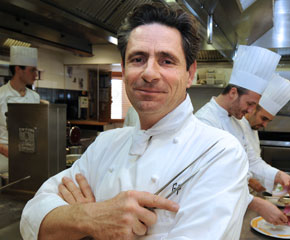Now ranked good enough to pull off the food bible’s top-of-the-class rating, Passedat’s seafront Marseille restaurant, Le Petit Nice, had already been discovered by the likes of Iggy Pop, Joe Cocker, Sting and the late Luciano Pavarotti.
Yet it took the self-trained chef who now heads a team of 49 people decades to find his style.
Turning 48 this year, Passedat is the third generation chef at the helm of the eatery. Family legend has it that his grandfather Germain, owner of a Marseille bar with a rare telephone from 1916, once overheard a countess asking her lawyer on the bar phone to sell her white villa overlooking the sea. Germain did not think twice and immediately bought it up.
A trained pastry chef, Germain opened his restaurant a year later and it was a quick success, drawing locals on Sunday for family banquets and weddings.
After the war, his son Jean-Paul dropped a career at the opera to study the trade, winning a first prized star for the cuisine in 1979 and a second in 1981. “My father’s passion for high cuisine was titillating,” said Passedat.
‘I didn’t think much of my cooking’
At age 12 he decided to become a chef. He enrolled at a specialist school in nearby Nice at the age of 16, going on to work as an assistant chef at top hotels such as the Bristol and Crillon in Paris and training with the legendary Troisgros in the town of Roanne.
But when he took over the kitchens of Le Petit Nice in 1990, Passedat says, “I didn’t think much of my cooking”.
Delving around, he tried his hand at avant-garde novelties such as vacuum-packed sea-water and fish-jelly but the clients pooh-poohed that. In the late 1990s he met and was enthused by the work of Spain’s molecular cuisine guru Ferran Adria, but wound up thinking, “We’re awful! What can we do!”
“That was when I realised that the sea was my destiny. It was right there in front of me and I hadn’t seen it,” he said. So the Mediterranean became his “vegetable-garden”, as he puts it.
He contacted small local fishermen as suppliers. From that time on Passedat began cooking species that had been forgotten, using techniques developed for meats by Jean Troisgros.
Passedat last October made it to the top category of the latest edition of another French foodie bible, the Guide Champerard, which hailed his “genius with little-known fish”. “Each dish gives you the impression of rediscovering fish,” the guide said.
Mediterranean fish such as tub gurnard, rockling, dentex and others became the backbone of his cuisine, notably in his version of the old local fish-soup recipe, bouillabaisse.
His menu is 98 percent fish and two percent meat. One speciality is creamy iodised sea anemones, nicely followed by very thin slices of deep sea, long-line fished bass “like my grandmother liked it”.
“There is very little decoration in my dishes,” Passedat added. “The important thing is the taste. The interesting thing is to cook up something good.”

